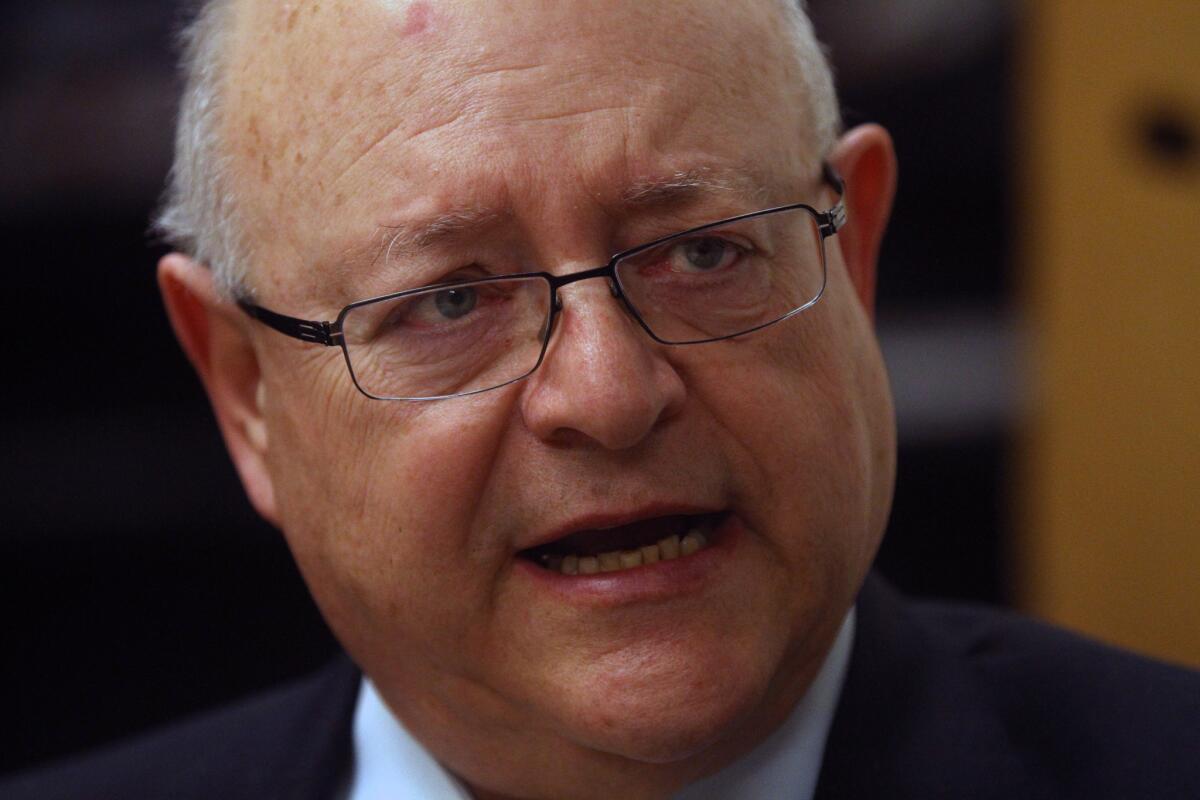Wide search expected in hunt for next UC president

- Share via
With no obvious inside candidate to be the next president of the University of California system, experts predict a wide search that will concentrate on similar university systems elsewhere but could also stretch beyond academia.
Whoever replaces Mark Yudof will take a job that comes with intense political and financial pressures. UC has an annual budget of $24 billion, 230,000 students, 191,000 faculty and staff members, 10 campuses, five medical centers and three national laboratories.
The next president also faces the controversial possibility of tuition hikes even with recently improved state revenue, as well as challenges to expand online courses and revamp hospital economics. And labor and student activists are sure to protest if the next president’s salary surpasses Yudof’s $591,084.
The search is secretive; officials say the selection process is a confidential personnel matter. Leading the effort is a committee of 10 UC regents, including Gov. Jerry Brown and student and alumni representatives. Its members declined to comment and so did the executive search firm—Isaacson, Miller.
Matthew Haney, executive director of the UC Student Assn., said he expected the next UC president to come from outside the state, as did Yudof, who previously led state university systems in Texas and Minnesota. (Yudof is retiring in late August after five years in the UC job.)
“It doesn’t seem as if [the UC regents] have elevated internal administrators for systemwide leadership to prepare them for this role,” Haney said. The campus chancellors “don’t have a significant or noticeable systemwide leadership presence,” he said, and other top administrators don’t have the national prestige that the faculty seeks in a president.
Well-informed observers say UC lost a possible inside candidate when Timothy White left UC Riverside’s chancellorship recently to take the top job at the Cal State system. Now, those people say, UCLA’s Gene Block would be considered a strong contender; Block insists, though, that he wants to stay in Westwood.
They also note other UC chancellors who may be reviewed: San Francisco’s Susan Desmond-Hellmann, an oncologist and former drug industry executive; Irvine’s Michael Drake, an ophthalmologist who previously oversaw UC medical education; and Santa Cruz’s George Blumenthal, an astronomer and former faculty leader.
(Drake declined to comment. Blumenthal and Desmond-Hellman issued statements saying that they were concentrating on their current positions but did not directly answer whether they wanted the systemwide job, which is based in Oakland.)
Educators inside and outside UC are compiling lists of people from other states who they believe could do the job. Among those mentioned are: Mary Sue Coleman, a fundraising dynamo as president of the University of Michigan; Francisco Cigarroa, a transplant surgeon who succeeded Yudof as chancellor of the University of Texas system; James Milliken, a former Wall Street attorney who is president of the University of Nebraska; Kevin Reilly, president of the University of Wisconsin system and an expert in online education; and legal scholar William Powers, who is president of the University of Texas at Austin and is a UC Berkeley alumnus.
Some attention also will be focused on possibly hiring the first woman or first non-white man for the post.
Untraditional candidates from government, industry or philanthropy may be attractive, according to Lt. Gov. Gavin Newsom, who is a UC regent. During past UC searches, even former President Bill Clinton would not have been considered because he did not fit the old model of a university leader, but that has changed, Newsom said.
“My sense is this moment in time may require broader consideration of someone with a fresh set of eyes, fresh perspectives, who can form new connections,” he said.
The national pool of those qualified who want the UC presidency may be smaller than in the past because the job “is a very challenging leadership position under these circumstances,” said Molly Corbett Broad, the president of the American Council on Education.
Still, she said, strong candidates will emerge.
“The University of California is the Mt. Everest of higher education both domestically and internationally,” she said. “There are leaders who see Mt. Everest and want to make the climb just because it is what it is.”
ALSO:
Man blows himself up at Costa Mesa home, police say
Clouds, drizzle expected to linger across Southern California
Free meningitis vaccines offered after West Hollywood man’s death
More to Read
Sign up for Essential California
The most important California stories and recommendations in your inbox every morning.
You may occasionally receive promotional content from the Los Angeles Times.











